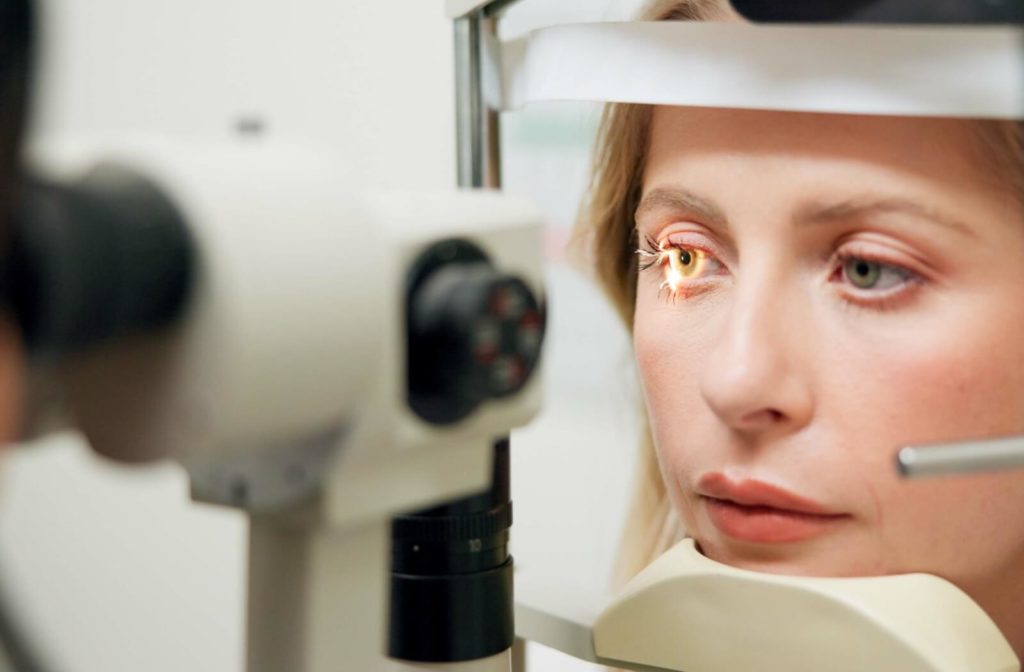Accidents happen, and sometimes they can be quite awkward or uncomfortable. One such instance is accidentally getting sperm in your eye. While this might sound like a bizarre or even embarrassing scenario, it’s important to know what to expect and how to handle it.
Getting sperm in your eye is generally not dangerous but can cause eye discomfort and irritation. Keep watch for any changes in your eye health like you would for any foreign substance and let your eye doctor know if you have any concerns. While this situation may feel awkward, it’s a manageable occurrence.
Mild Effects You Might Experience
As you may expect, when sperm comes into contact with the eye, it can cause immediate discomfort. Effects are usually temporary and include:
- Redness: The eye may turn red due to irritation.
- Stinging or burning sensation: The chemicals in sperm can cause a stinging or burning feeling.
- Watery eyes: The eye might produce tears to wash away the irritant.
- Swelling: In some cases, the eyelid may swell slightly.
These symptoms are typically short-lived and should subside within a few hours to a day as the eye removes the irritant naturally.
Is It Dangerous?
While the experience is undoubtedly unpleasant, it’s rarely dangerous. There is a very low chance that sperm could cause:
- A stye: A stye is a blocked gland in the eyelid that appears as a red spot or a bump. It’s typically caused by bacteria and some people believe sperm can cause one. However, this is probably not the case. It’s much more likely for a stye to be caused by someone scratching their eye.
- Conjunctivitis: This is an infection that bacteria can cause, along with viruses and allergens. Chlamydia or gonorrhea bacteria in sperm could trigger this type of inflammation.
If symptoms such as redness, swelling, or grittiness persist, it’s crucial to seek medical advice to rule out any complications.
Sexually transmitted infections (STIs) & the Eyes
In most cases, getting sperm in your eye is not harmful. However, there are specific situations where you might need to take extra precautions. If you or your partner have a sexually transmitted infection (STI), there’s a risk of transmitting the infection to the eye.
STIs can indeed affect your eyes. Here are a few to be aware of:
- Chlamydia: This bacterial infection can cause redness, discharge, and swelling in the eye.
- Gonorrhea: Another bacterial STI that can infect the eye, leading to similar symptoms and potentially more severe complications.
Other STIs can affect your eyes, but it’s extremely rare for sperm in the eye to cause one of these infections. Still, they’re worth being aware of. These include:
- Syphilis: This infection can travel through the bloodstream and impact various parts of the eye, potentially leading to serious conditions like interstitial keratitis, which can reduce vision.
- Herpes Simplex Virus (HSV): HSV-1 and HSV-2 can infect the eye, causing pain, redness, and blurred vision. In severe cases, it may lead to scarring and blindness.
- Hepatitis B: This virus can damage the retina and other parts of the eye.
- HIV/AIDS: Individuals with HIV are more susceptible to eye infections due to their weakened immune systems.
In most cases, prompt treatment with antibiotics can effectively manage these infections, but early diagnosis is crucial. If you suspect that sperm in your eye may have transmitted an STI, it’s crucial to seek medical advice promptly.

What to Do if You Get Sperm in Your Eye
If you get sperm in your eye, first, don’t panic! Second, don’t be embarrassed to ask for help. At the end of the day, it’s just another bodily fluid. So whether you’re dealing sperm, blood, or saliva, here’s a step-by-step guide on what to do:
- Rinse immediately: Use clean, lukewarm water to rinse the eye thoroughly. You can use a cup or your hands to gently pour water over the eye or use an eye wash station if available. You can also sit in a chair, tilt your head back, and have someone gently pour water over your eye.
- Avoid eye rubbing: Rubbing the eye can exacerbate irritation and potentially cause more harm.
- Use eye drops: Over-the-counter saline solution or artificial tears can help soothe the eye and flush out any remaining irritants.
- Monitor symptoms: If redness, pain, or swelling persists beyond a few hours, seek medical attention.
If you wear contact lenses, set them aside until the irritation has completely subsided to help prevent further discomfort or infection.
If you’ve followed the above steps and still experience discomfort or suspect an infection, don’t hesitate to seek medical assistance. Persistent symptoms, severe pain, or discharge could indicate an underlying issue that requires professional treatment. Your health and well-being are most important, and timely intervention can prevent complications.
A Gentle Reminder
It’s always beneficial to exercise caution and maintain good hygiene practices to prevent such incidents. Safe sexual practices and being mindful of your surroundings can minimize the risk of accidental exposure.
Take Charge of Your Eye Health Today
At York Mills Eye Care, we understand that unexpected situations can also be uncomfortable. Our team of eye care professionals are here to provide the support and care you need. Whether it’s a routine checkup or addressing an urgent concern, we’ve seen it all and we’re dedicated to helping you maintain your eye health without judgement. Book an appointment with us today and stay safe.




